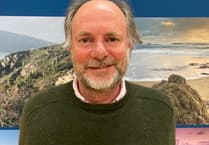Professor Peter Stott, MBE, was this week’s guest on Radio 4’s The Life Scientific. His work on the science of climate change spans two decades, and in 2007 he won the Nobel Peace Prize alongside his colleagues for his contributions to the Intergovernmental Panel on Climate Change (IPCC) and was awarded an MBE earlier this year for his work at the University of Exeter and the Met Office Hadley Centre.
These local institutions are at the forefront of the science for understanding the Earth’s systems. Prof. Stott and his team inform government and policymakers on how the climate is changing due to human activities and the burning of fossil fuels rather than natural variations in our climate system. And Peter was the first to link an individual weather event, the 2003 European heatwave, to climate change.
Despite such world-class institutions and science in our region, Prof. Stott believes that the seriousness of the risks of climate change are not generally realised, and “there is still a vested interest in delay that is really dangerous”.
There has been a long campaign to discredit climate research and even individual climate scientists, funded by those wanting to obstruct climate legislation to protect their businesses, trade and investments. The proliferation of bogus scientific reports and news stories have created a narrative of climate denial, amplified by social media.
Researchers at Brown University in the USA recently reported that a quarter of tweets on climate change were posted by bots (computer programs that perform automated tasks online imitating human behaviour), programmed with the aim of spreading climate denial. Tweets promoting ‘fake science’ were found to have been written by bots 38 percent of the time.
Climate denial has become more subtle, disputing the solutions rather than the science, questioning the effectiveness of renewables and EVs, and exaggerating the cost of the energy transition. This is picked up by the public who mistakenly perceive that there is a groundswell of opinion underlying these false claims.
So what do we say to people who don’t accept that climate change is serious? Prof. Stott points to what is happening around the world – heatwaves, floods and droughts, the warming ocean and melting glaciers – and we can direct them to reputable sources of information, such as the UK’s leading science body, the Royal Society, the Met Office and our universities.
If more evidence were needed, oil companies themselves accept the climate science and the need to reduce emissions to stabilise the climate, and host statements to that effect on their websites. And 195 countries have signed up to the wording of the IPCC summary reports on climate for policymakers, including oil, gas and coal producers like Russia, Saudia Arabia, UAE and China.
So we need to stop listening to those who would have us sit on our hands and do nothing. More people accept that climate change is happening than don’t. Together we can decide that we have seen enough climate change already and demand that those in positions of power make real change – before it’s too late.




